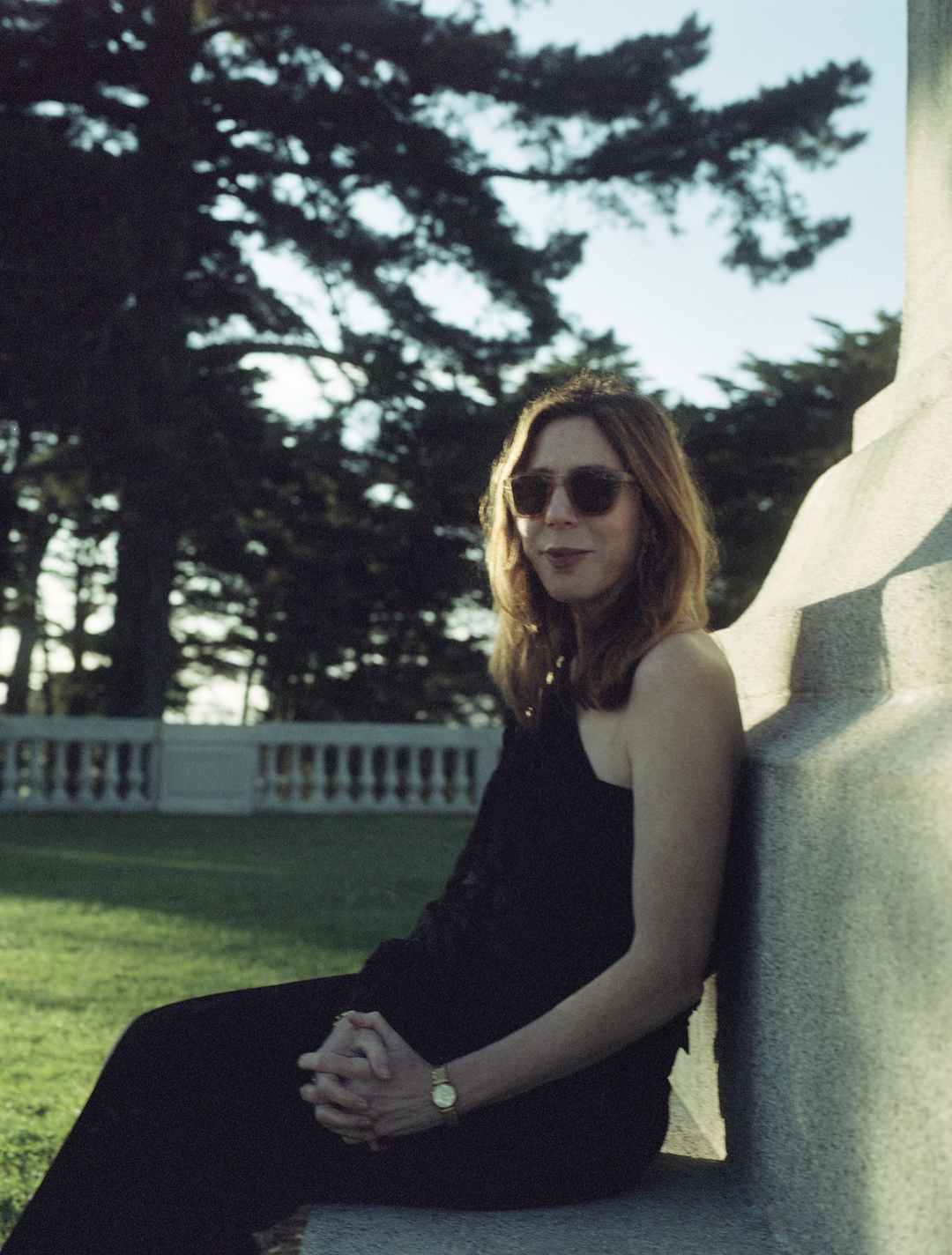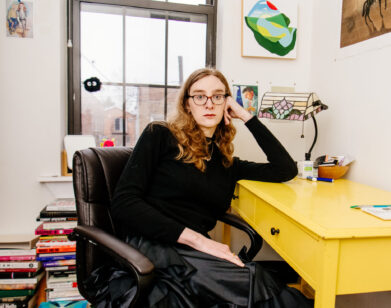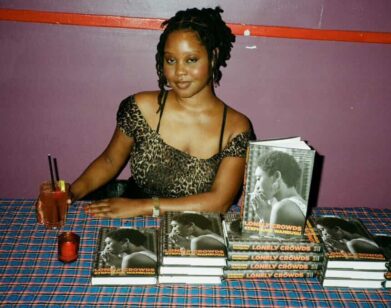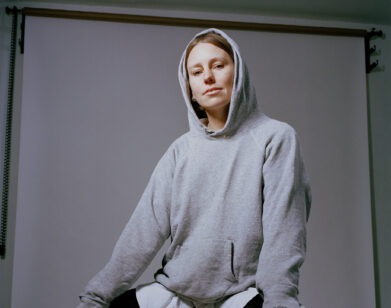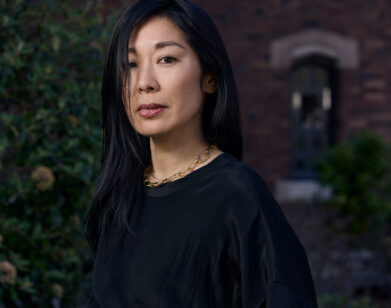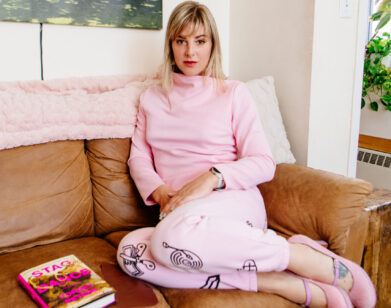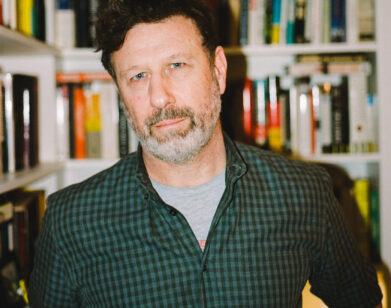LIT
Rachel Kushner on Creation Lake, Political Fiction, and Staying Off Twitter
I’ve never been an audiobook person, but recently I devoured Rachel Kushner’s Creation Lake through my headphones while in the hospital. Kushner has a cool, formidable writing voice for translating genre into something larger, more cosmic. Her previous book, The Hard Crowd, performed a similar exegesis on the typical nonfiction essay covering topics from Marguerite Duras to prison abolition. As tweets about the new book continued to spiral out, I wanted to get closer to the text, to excavate it beyond mere plot points. Simultaneously, I’d been reading the work of the recently passed Frederic Jameson, who argued that the work of Ernest Hemingway was not about “courage” but about the search to write “a certain type of sentence.” Creation Lake, meanwhile, is not merely about a commune being disrupted by a spy but about understanding the novel as a container. As Ursula K. Le Guin put it: “The Carrier Bag Theory of Fiction.” How many sedimentary layers can co-exist at the same time? When I caught up with Kushner last week over Zoom, we discussed Jameson, but also Cormac McCarthy, Don DeLillo, the purpose of the contemporary novel, and whether or not she reads Twitter.
———
RACHEL KUSHNER: I’m sorry I’m a couple minutes late.
GRACE BYRON: No worries at all. Where are you right now?
KUSHNER: I’m at home. I was away for a month and I just got home on Sunday night from Ireland, via London, and now home.
BYRON: That’s a lot.
KUSHNER: I was in a different city every day basically for 28 days. By the time I got home on Sunday night, my eggs were scrambled. I went to sleep and I heard my husband come into the bedroom and I yelled, “Who’s in my room? Who’s in my room?” And he goes, “It’s Jason.” I did not know where I was. Anyway, now I know where I am.
BYRON: Where is home for you these days?
KUSHNER: I live in Los Angeles. I have lived here for 21 years, and in this house since 2008. Through the windows to my right you can see downtown Los Angeles. You have to walk under a freeway to get there.
BYRON: Do you work from home?
KUSHNER: I do. Maybe it’s not for everyone. If I’m deeply engaged in what I’m doing, it kind of doesn’t matter where I am. I could write anywhere once I dig into the thing and get inside the trance. But right now I just love to be in my office, even if I’m not inside that special pocket of making fiction. I have all my things I want to read in here.
BYRON: Have you been thinking about Fredric Jameson’s passing?
KUSHNER: The Jameson thing was weirdly shocking, even though he was 90.
BYRON: I didn’t realize he was that old.
KUSHNER: I had received a letter from Fred Jameson earlier this summer about my work, not just the new book, but all of it. It was a brief letter, but very complimentary. And it was a shock to get it because you don’t expect people of his position to even know who I am. Stupidly, I was this combination of intimidated and lazy because [a letter like that] it forces you to be like, “Oh, I’m going to have to sit down and write something intelligent to this man who reads a novel a day.” And I was caught up in the less interesting world of getting ready to publish a book and just steeling myself for the future. So I thought, “Oh, I’ll write to him when I get home.” I was in London on Sunday, September 8th having lunch with Perry Anderson, who is a friend in his own way, like an elder and a mentor. And apparently Jameson had died either the night before or that morning. The news hit that day and neither one of us knew, but we were talking about his work basically the whole lunch, including many of his arguments about fiction. And then I walked away from lunch and got a note from my husband that Jameson had died.
BYRON: That’s wild. What did his letter say?
KUSHNER: I have it right here on my desk. He said, “Dear Rachel Kushner.” I sent him Creation Lake. He goes, “I don’t know how you guessed. You were one of my favorite authors.”
BYRON: Oh my god.
KUSHNER: And, “I have been waiting eagerly for your next novel. I should say that The Flamethrowers is also one of the favorite books of many of my students. At any rate, here it is. And as you can imagine, I devoured it at once. I’m fascinated by the oblique perspective that you bring to all this, and the atmosphere of treason and betrayal that floats over it. That would perhaps be a whole study in itself, but I would be curious to see what my student and friend Kristin Ross thinks of it, inasmuch as she has been so closely associated with the various ZADs in Notre-Dame-des-Landes. Meanwhile, the prehistoric dimension opens all this up into infinity. A fascinating artifact. Many thanks again.” Signed in red ink.
BYRON: That’s so cool. Let’s jump into talking about the book. I thought it was interesting that you named the sections. I always find it interesting when authors decide to name chapters, or not name chapters.
KUSHNER: Well, part of executing the book for me—I mean, I worked on it for three-and-a-half years before I figured out how to do it. That was a challenging time. Then suddenly, I hit a vein and I wrote the whole thing in 14 months. And part of my mission in the execution of the actual narrative was very short chapters. That was a specific plan, partly modeled on the effect that this early Cormac McCarthy novel called Child of God had on me.
BYRON: That’s one of my favorites.
KUSHNER: I love that book. And the beginning of that book is very short chapters, and you come to know a lot quickly. That shortness, it’s like McCarthy is shoving you into the next section: shove, cliffhanger, shove, shove. And if I read the book again now I might have a different experience of it, but the effect it was having on me was something that I wanted to reproduce in my own novel, that pacing and the brevity of the chapters. And I decided these should be broken up into book sections rather than chapter one, chapter two, chapter three, because they’re more like movements. The titles I chose all have secret meanings to me. “The Delights of Solitude” is the name of a piece of Baroque music by Michel Corrette. “Priest Valley” is obviously the place that Sadie claims she’s from, and for me it could have been a title for the book, although I’m very happy with Creation Lake.
BYRON: I read in one interview that it took you a long time to find Sadie. And in another you said it was really hard work crafting Romy [of Kushner’s The Mars Room] too. How did you choose to layer those characters in, or discover them as a vehicle through which the events of the novel would take place?
KUSHNER: It’s funny, several straight men, including my own husband, have said to me that Sadie is a lot to deal with—and I myself find her semi-insufferable—but they can’t help but be sexually curious about her. Several people have said that. It was quite different how I landed on the two of them. With Romy and The Mars Room, I wanted to write a contemporary novel about California as a place I live and a place I know, but from the perspective of somebody who is sucked into this system that I myself am protected from, because my parents loved me and were middle class. But I grew up with people who were less lucky, and I had started to feel like if I don’t put them into a novel, they will not be in books whatsoever. I had been thinking about prison in California, and women, and doing a lot of working alongside colleagues in human rights groups who were and are serving life sentences. I needed to make the narrator somebody who could have depth and dimension that I would have authority and control over. At first, I did not want to make her a girl from the Sunset District in San Francisco who would have my friend group, who would have some of my background and memories and experiences. But I ended up doing that because I saw no other way to give her what she needed.
BYRON: Absolutely.
KUSHNER: Who is going to report on the world, observe it and be its teller, is critical. And in a way nothing can happen until that is figured out. [With Creation Lake], I knew the regional landscape of this part of France very well, and I know the milieu. I know French Communards. I know the American who comes in to translate, because my husband has translated for the Invisible Committee, and my son knows the whole underground structure of this part of France because he’s a caving guide there to French children in summer camp. But who would arrive at this place and speak of it? Maybe that person would be transformed by that experience. So let’s say it were a young American woman who arrives because she wants to be a Moulinard, wants to be part of that world. I knew a couple of people who did that and it didn’t really go well. And it was only when I realized that Sadie was a kind of devil who is traveling there for the purpose of interfering and doing those people harm that I felt I could render the place in the way that I wanted. At first, I thought that she would end up getting her comeuppance at the end. It would be a really mean ending. But because the reader is with her for basically the entire book, it seemed like it would be too moralizing. Betrayal doesn’t pay.
BYRON: Definitely.
KUSHNER: So the ending worked out quite differently. But part of writing her, it just happened. I knew that there was this world where people fall from grace with these police agencies, where apparently they think it seems neat or fun to spy on other people and even entrap them and send them to prison. I had seen that happen both in the US and with a British agent who infiltrated the Invisible Committee, among other groups. In Germany, England, and in this particular case in France, [there are people] who got found out and then left the public sphere, insofar as spying is in the public domain. They’re paid for by taxpayers. This is what happened to Mark Kennedy, who had infiltrated the Invisible Committee and some other groups. It was all in the tabloid newspapers, where all these women had come forward and said, “That was my boyfriend. I was having sex with him.”
BYRON: Wow, that is a fascinating case.
KUSHNER: Several of these women sued the Metropolitan UK Police and got settlements, I believe. And then he countersued the state for “failing to protect him from falling in love,” or something like that. Then he disappeared into the private sector and ended up working for the company that used to be called Blackwater, the military contractor. This is dirty stuff, so I imported some elements, like starting with a disgraced agent. For Sadie, her founding story is, “I entrapped this guy and then he fucked me over because I was fired when his lawyer established that he’d been entrapped.” She blames him for the fact that she sent him to prison. It’s contorted logic, but for her it’s like a founding myth, her primal scene.
BYRON: Do you feel like the book was at all an autobiographical response to our current moment? It sounds like a lot of it was drawn from your life, or things that you knew firsthand.
KUSHNER: Well, that is in part the mystery of fiction.
BYRON: Fair enough.
KUSHNER: The occasion for it is for me to build a parallel universe that puts into synthetic round all of these things that deeply obsess me, or that I think have to do with me on some level. I’m speaking vaguely, but for those of us who’ve lived through the last 15 years—since the anti-globalization movement, since Tarnac was raided by the French State before dawn in 2008, since students got together to occupy the University of California to protest tuition hikes in 2009, or in 2011 when the Occupy movement began—a lot of us have lived through turbulent times. And the hopes and failures of organizing some of that has gone into the book.
BYRON: Absolutely. I’m curious to know if you feel that the book telegraphs a certain politic, or an idea about cynicism with the Moulinards in terms of Utopian history? Especially towards the end, the book is playing on the myth that we have about communes, and the myths that we have around Utopia and leftist history. Do you feel it’s sort of a signposting any ideas?
KUSHNER: Oh, man. I mean, it’s absolutely a fair question. My only real definition of art, the one one that I bring up in response to the specter of the political, is that it renders the unseen seen. I feel like this is a special role. I’ve had these experiences walking through a museum or seeing a theatrical performance or sitting in a movie where you catch a drift of something that feels very real to you. But without the vehicle of the art, you would not be able to experience it. And what that means is that that thing can never be reduced to a message, much less a political message. And as someone who is unafraid to take a position, I would like to think that if I had a political argument to make I would simply make it. But in this case, I had doubts, dreams, questions, and experience. I mean, everyone does. Mine is not necessarily special, but I have experience in a milieu alongside people who do believe that society could be organized in a better way than it’s organized right now. I don’t have any answers in terms of the future or what should happen. Maybe I feel that I can spread myself out across the landscape and ventriloquize different points of view. But that doesn’t mean that I don’t have a politic. I couldn’t write this book without having one. At the same time, the occasion of art is not a place for, as I think you put it, “signposting,” although there are little indications just by the very nature of the topic I chose. I don’t think of the reader when I’m writing. It’s more like the god of me standing behind me needs to be pleased by what I’m generating. They need to be entertained and drawn in. Maybe that’s a digression from what you asked, but it’s more like the very fact of the book, and including throughout it these little signs that only some people would recognize, encodes it with something secret.
BYRON: I don’t think you’re on Twitter, but this description [from the book] of what Europe actually is has been going around, and I think it’s interesting that that is one of the sections of the book that has caught the popular imagination. It also made me think about [Don] DeLillo and the systems novel, among other concepts. So I wonder if any of that was present in writing this book.
KUSHNER: So I am not on Twitter, but I did hear about this. I also heard that it was being retweeted as something that I said.
BYRON: That happens on Twitter, where people will quote a book, regardless of the context, and just say that this is what this person is saying rather than—
KUSHNER: There’s nothing I can do about that. I guess this is patronizing of me, but in terms of anybody misinterpreting a passage of my book, which is very much voiced by a narrator who is a kind of devil, for them to think it’s me and to be mad… I worry about people’s souls. In any case…
BYRON: Well, certainly not everybody argues in good faith on Twitter.
KUSHNER: I don’t want to log on and I don’t really want to see that stuff. But when she says that, it’s kind of incredible when you take these larger auto routes through France, which is an enormous country. As Sadie says, it’s the size of Texas. And these auto routes, from what I understand, are mostly built by the European Union. And they’re just part of this larger structure and what it means to be in a state with an enormous, vast, complicated industrial apparatus. You see these guys on the side of the auto route on the highway with these trucks, and they’re part of the system. They’re wearing this blue uniform that has the reflective band around the cuff of their pants. So on some level, a cynical and sort of obnoxious narrator like Sadie could say, “Oh, this right here, this is the real Europe.” But of course, there is no one real Europe. She’s ripping off the mask of regional history and pride and all the different languages that comprise France. On another level, I guess people seized on this idea of a borderless network of supply and transport, but she’s talking about the supply chain. And some of that is real. There’s been such extreme out migration from rural France that a lot of people are now driving 60 or 80 miles to buy groceries. They’re not buying local products. They’re buying something that was packaged and freeze-dried and shipped to the store. So she’s giving a more jaded view of some of the aspects of life and contemporary France that don’t necessarily conform to a more romantic view of it. I mean, she’s also drunk.
BYRON: Right.
KUSHNER: In terms of DeLillo, I would say that his novel The Names was the book of his that was kind of on my mind while I was hoping to figure out how to write this one. I don’t mean to sound arrogant by putting myself on his level, because I don’t, but he’s an important writer to me and he’s also been a mentor to me over the years. So The Names was the novel of DeLillo’s that seemed to have a kindred type of artistic purpose, in the sense of rendering the contemporary as experiencing intrusions or eruptions of the ancient past.
BYRON: I volunteer with this organization that works alongside incarcerated writers. I wonder what you would say to writers who are on the outside of the system, or maybe aren’t as impacted by the system, since I know that’s something you’ve done before.
KUSHNER: Yeah, I do a lot of that. Not everybody likes to go this route, but I have been involved with trying to get people free. Writing letters for their parole board hearing, coaching them, helping them get ready for these hearings, helping them when they come out, partly because some of the people that I’ve met inside do not have a support system in the outside world. Often when I’m reading other people’s work, especially if that person is a student or is somebody who’s in the process of developing their voice, it’s not about technical polish, because it wasn’t about that for me when I was starting out. And in that realm, anyway, I was probably on the bottom of the barrel. It’s not something that concerns me, really. But I do think our society gives such unequal opportunities to people in the artistic realms of writing and visual art. It’s incumbent upon us to transform our judging process to make it more inclusive. In the art world, for instance, people are always looking for things that just look like art to them already. But you have to meet art on its terms and based on where it’s coming from, because there are going to be profound differences in outlook and experience among those who were born into a different milieu than you. So it’s always about not trying to put my template for what art is on something that someone else has made, trying to always remain a student and learn from other people, especially incarcerated people. Because without wanting to romanticize, I think there are forms of insight and intelligence that you learn there that are extraordinary and that I cannot structurally possess.
BYRON: Absolutely. And my last question: what was the last good movie you saw?
KUSHNER: Oh, man. It’s funny you ask me that right now because I just did this Adventures in Moviegoing project for the Criterion Collection. One of the movies that I talked about is Mother Küsters Goes to Heaven, by [Rainer Werner] Fassbinder. I think that movie is so wonderful and so funny. I love that movie and I think of it from time to time when I see the way that people—how do I put this?—don’t want moral complexity. And that movie provides it.
BYRON: That’s something we need more of.
KUSHNER: Where are you right now? Are you at home?
BYRON: I’m at home. I haven’t really been leaving my house very much except for doctor’s appointments. Watching a lot of movies has been a big thing.
KUSHNER: Well, it sounds like a time for conserving your energy. What have you watched that you’ve loved the most?
BYRON: I’m a big [David] Cronenberg fan and I watched Map to the Stars.
KUSHNER: [Grimaces]
BYRON: You’re not a big fan?
KUSHNER: No, I can’t handle it.
BYRON: I watched What a Way to Go. Have you seen that movie? It has Shirley MacLaine and she has about a thousand outfit changes and the sets are crazy.
KUSHNER: I love Shirley MacLaine.
BYRON: I rewatched The Gleaners and I on my birthday, because that’s one of my favorite films of all time. Have you seen that one?
KUSHNER: Oh, yeah. Agnès Varda is wonderful. Have you seen that movie Faces Places that she made? I think about the woman in it who is living in that housing development for the coal miners, and she’s one of the last residents. You know that scene? She talks about her father going down into the mine and how all the kids would surround him when he came out of the mine, because they wanted the heel of the bread from his lunch, and how it would taste different because it had been deep down inside the earth.
BYRON: It’s a good one.
KUSHNER: Well, it’s been nice chatting with you.
BYRON: You too.

